Ann Arbor Civic Theatre's take on "The Curious Incident of the Dog in the Night-Time" is a mystery that explores a spectrum of emotions and relationships

Cassie Mann was a fan of Mark Haddon’s best-selling novel The Curious Incident of the Dog in the Night-Time and was excited when Simon Stephens' stage version became a hit in London and New York.
“I went to New York and saw the Broadway version and just loved it,” she said. “It’s got so many elements to it. It’s a family drama, it’s got humor, it’s a mystery, it’s got themes of perseverance and it’s a good character-driven play and yet it’s got a love of fun stuff that goes along with it.”
Mann wanted to direct a production for the Ann Arbor Civic Theatre and was all set to stage it in 2021, when the show was canceled because of the pandemic. This pause gave Mann a chance to delve a little deeper into the play and its unusual perspective.
The Curious Incident of the Dog in the Night-Time begins as a mystery. Fifteen-year-old Christopher Boone discovers the corpse of a neighbor’s dog and sets out to discover who murdered the dog. Though never explicitly remarked on in Haddon’s novel or Stephens’ play, Christopher is on the autistic spectrum. The story of this mystery and what comes after is told from Christopher’s perspective as a sort of therapy suggested by his teacher, Siobhan.
The play is a family drama revolving around Christopher’s troubled relations with his parents. But it’s also a celebration of his determination, his wit, and his mathematical genius.
Mann read some books on autism and one book in particular influenced her approach to the play.
A modern Marion takes the lead in U-M’s "The Heart of Robin Hood"

The legend of Robin Hood has been told for centuries. In the usual version, he is a nobleman who has been forced from his estate. He gathers a band of “merry men” who are dedicated to robbing from the rich and giving to the desperately poor.
But in earlier versions of the story, told in verse and song, Robin robbed from the poor but didn’t give to the rich and didn’t have noble aspirations. Playwright David Farr has returned to that earlier version of Robin Hood and to a very different Maid Marion, who challenges the outlaw to be a better man.
The University of Michigan Department of Theatre and Drama will present Farr’s The Heart of Robin Hood at the Power Center for the Arts, December 8-11.
Director Geoff Packard said that Farr takes a decidedly different view of Robin Hood and his Merry Men.
Shakespeare's "Much Ado About Nothing" gets a contemporary update with new music at Ann Arbor Civic Theatre

"Therefore play, music."
—Benedick, Much Ado About Nothing
It’s become customary for directors to find ways to make Shakespeare more accessible.
When director David Widmayer proposed the Bard’s Much Ado About Nothing as the play to welcome audiences back to the Ann Arbor Civic Theatre, he embraced Benedick’s call for music.
“My original pitch was to replace the violence in the show with the metaphorical violence of a battle of the bands,” he said.
That proposal was turned down, but music remained a key element for the production, including some cast members creating original compositions for Shakespeare’s verse.
Widmayer has performed in several Shakespeare productions at the Ann Arbor Civic Theatre. This is his second time directing a Shakespeare play.
“I was looking for something that basically we could have fun with and get the audience back into the theater,” Widmayer said.
In Widmayer’s reimagining of Much Ado, musicians and artists go off to war but when they return they lay down their arms to return to the arts. The time is now, but the titles and arrangements of Shakespeare’s world exist in this imaginary version of modern times.
“It’s a place where people can come and perform music and find joy in that art together,” Widmayer said.
Mystery Train: Concordia Theatre takes the audience for a ride on the Orient Express
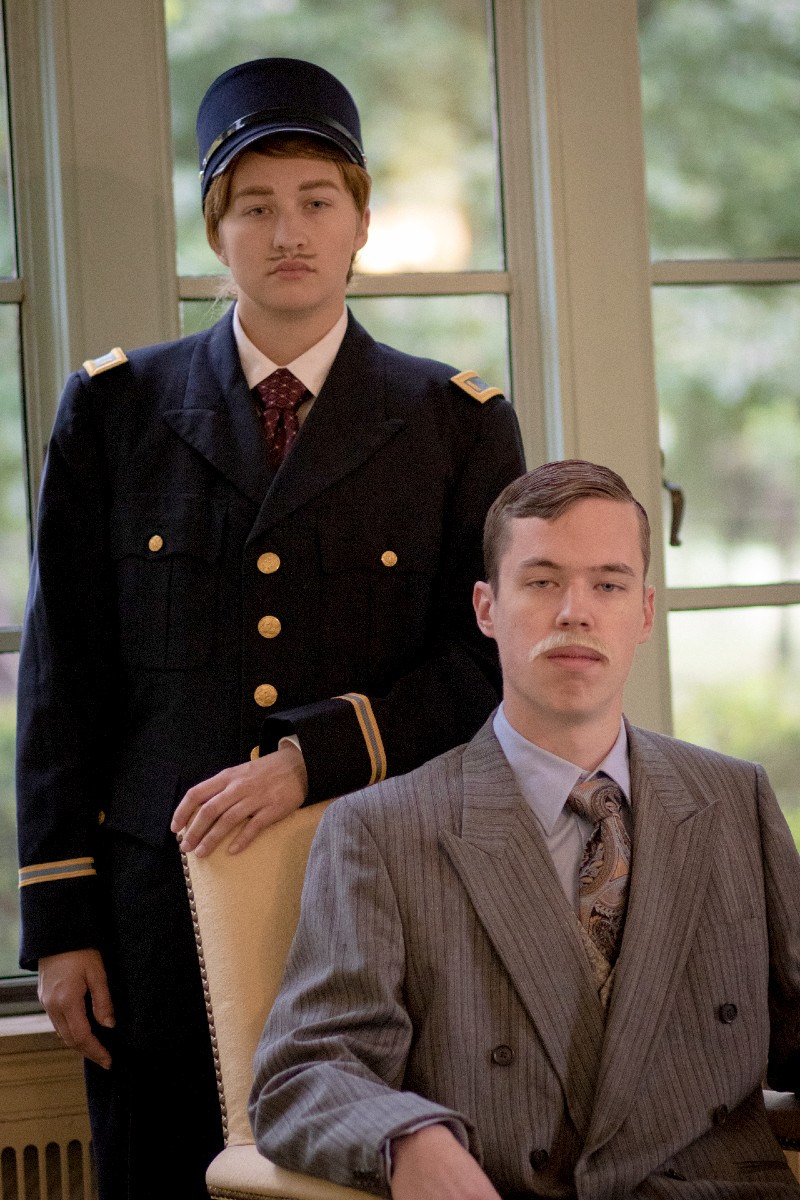
On October 10, the intimate Black Box Theatre at Concordia University was a warehouse full of pianos for a used piano sale. By the end of the month, the 200-seat theater will transport an audience across a winter landscape from Istanbul to central Europe on the legendary Orient Express.
And murder is afoot.
Concordia’s theater department is presenting Ken Ludwig’s stage version of Agatha Christie’s ever-popular Murder on the Orient Express, October 27-30. Hercule Poirot, the eccentric Belgian private detective, will twirl his extravagant mustache and use his gray matter to solve a complex case of murder as the Orient Express makes its way west before being trapped in a blizzard.
It’s a challenging case for Poirot with so many suspects and it’s a challenge for Concordia with the play's unusual setting, numerous European accents, and a large cast of potential murderers.
But Concordia’s theater director Amanda Williams is happy to accept the challenge of presenting a famous mystery and giving a tip of the hat to the woman who transformed the mystery genre, Agatha Christie.
U-M Department of Musical Theatre's "Sophisticated Ladies" is jumping with talent
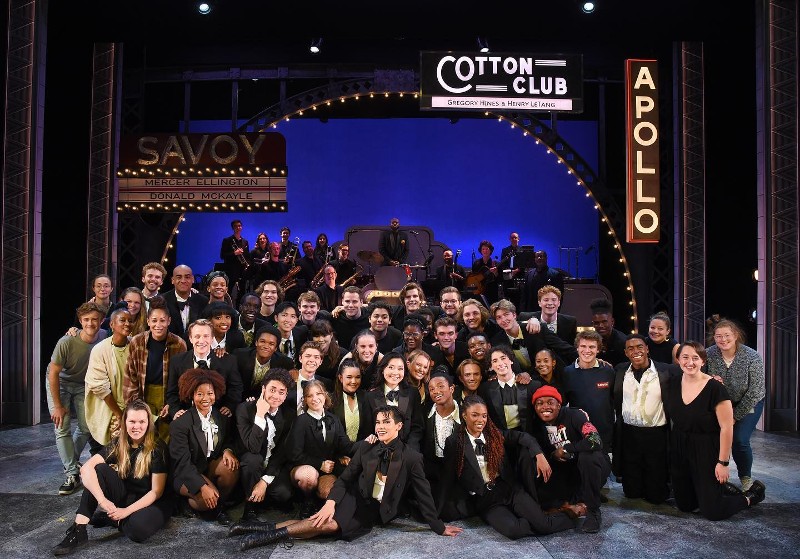
It don’t mean a thing if it ain’t got that swing!
And, man, is it swinging at the Lydia Mendelssohn Theatre during the University of Michigan Department of Musical Theatre's sizzling production of Sophisticated Ladies. The musical revue is a tribute to Edward Kennedy “Duke” Ellington's ever-enduring music and the modern dance styles that it inspired.
Guest directors/choreographers Torya Beard and Ayodele Casel are dancers who realize the immense talent of U-M’s students and provided these future stars with the support and freedom they needed to excel. They also brought in dancer Mercedes Ellington to talk about her art form and to discuss her grandfather Duke and her father, band leader Mercer Ellington. The result is a production of almost nonstop energy, from the orchestra and the large company of dancers to the varied takes by several singers on Ellington’s beloved songs.
Under the musical direction of Maurice Draughn with Tyler Driskill at the piano, the orchestra is always on stage and performs in top form.
Chekhov's "Three Sisters" gets a risqué update in U-M’s "Moscow Moscow Moscow Moscow Moscow Moscow"
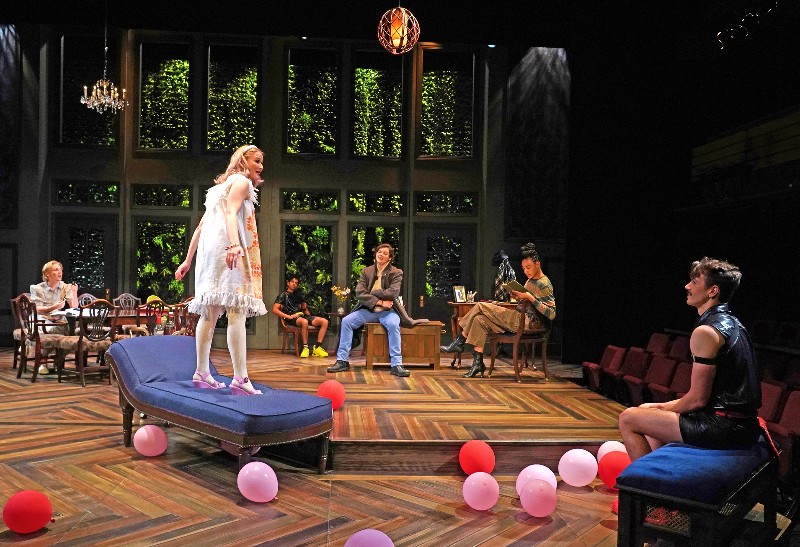
Playwright Halley Feiffer had the clever idea of taking Anton Chekhov’s play Three Sisters and kicking it into the 21st century.
It’s one of those creations that begins with the question, “What if?” What if Chekhov were writing his play today using raw contemporary language with lots of profanity, slang, catchphrases, snarky attitudes, and even a few funny jokes backed by some hot early 2000s music?
The result is Moscow Moscow Moscow Moscow Moscow Moscow being presented at the University of Michigan’s Arthur Miller Theatre. Director Ryan Dobrin takes the idea a bit further in his production at the university by setting Chekhov’s characters “in a more diverse context,” according to a program note. The result is a comic mashup that draws, again according to the program notes, on the affectations of Paris Hilton and the Kardashians as well as on gender-identity issues.
The playbill also comes with a warning that the play may be “upsetting, offensive, or triggering for some audience members” and advises caution. Some of those who might respond that way are fans of Chekhov who might not appreciate what Feiffer has done to his play.
Encore Musical Theatre’s Fats Waller tribute "Ain’t Misbehavin'" struts and swaggers
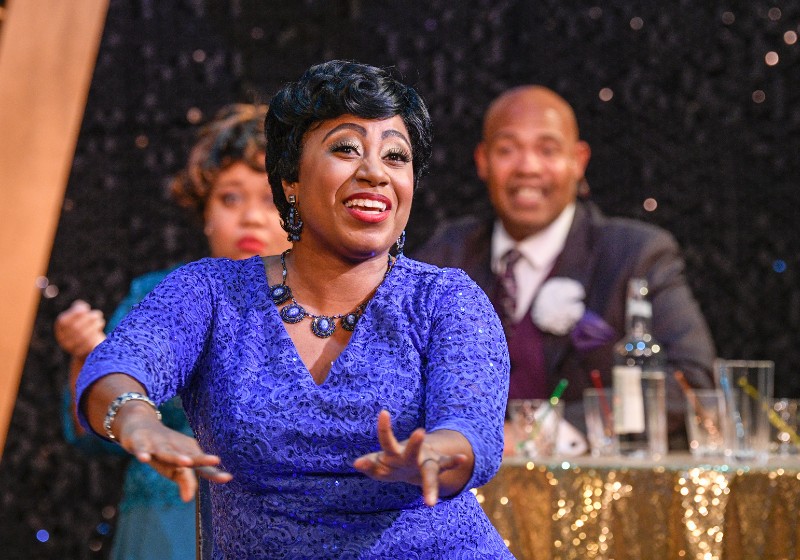
Thomas Wright “Fats” Waller was only 39 years old when he died of pneumonia but in that short life the effervescent showman, composer, singer, master pianist, and amiable comic packed in a lot of life.
The Broadway hit Ain’t Misbehavin’, conceived by Richard Maltby Jr. and Murray Horowitz, is not a musical biography of Waller but rather an infectious presentation of his music and a rollicking recreation of the pianist's uptown swing.
The Encore Musical Theatre Company is taking its audience back to a swank Harlem club to experience that other time and place. Director and choreographer Gerry McIntyre presents a polished, sassy, and moving production that swings from happy-go-lucky and downright sexy to a bit more reflective tone. That arc gives a portrait of Waller that explains his life more than a lecture ever could.
What Price Genius? Theatre Nova’s "Relativity" explores the complicated life of Albert Einstein
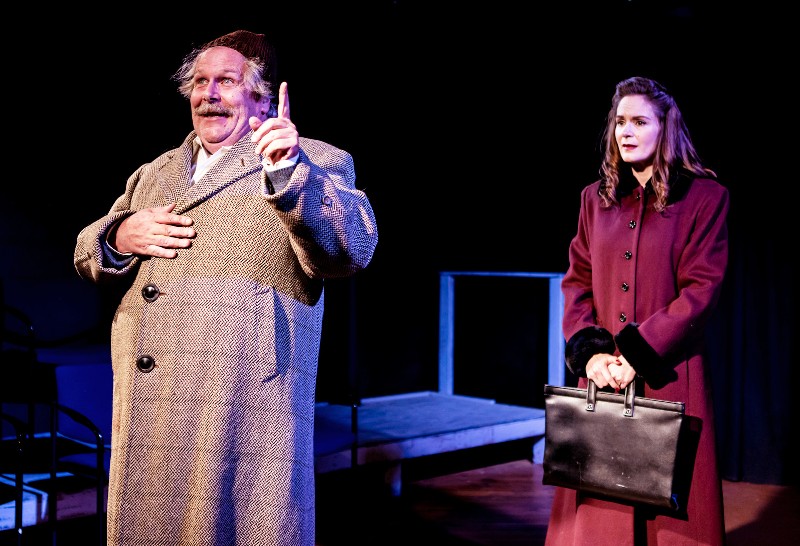
Can a great man also be a good man? What do the words great and good mean?
This is the theme of Mark St. Germain’s play Relativity, which explores the character of physicist Albert Einstein, who has become the very definition of genius.
Germain takes a troubling decision by Einstein and its impact on his professional and personal life to explore the complex balances and compromises that people make to follow their passions, in Einstein’s case a passion that would change forever the way we look at the universe.
Carla Milarch directs the Theatre Nova production of Relativity, which strikes a complex balance of its own, weighing gentle comedy against serious inquiry into the compromises Einstein made to follow his genius.
Encore Theatre premieres a new musical based on the life of silent star Lon Chaney

In addition to presenting classic American musicals and lively cabaret shows, The Encore Theatre in Dexter is also doing its part to expand the musical theater repertoire with premiere presentations of new musicals.
This month, Encore is presenting the world premiere of A Thousand Faces, a musical bio on the life of silent-screen star Lon Chaney.
As with any new theatrical production, the first presentation is an opportunity for the creative team to make adjustments and test run the audience's response to the new material. The book writer, the composer, the lyricist, and the director will tweak this show as the weeks go on.
They’re off to a good start but audiences might be a bit surprised by the show’s approach to telling the Chaney family story.
Along with the great silent comedy stars, Lon Chaney's name and films still resonate with audiences. He was the man of a thousand faces. He was an actor who hid himself in characters that were both physically and psychologically damaged. Chaney was famous for his performances in The Hunchback of Notre Dame, The Phantom of the Opera, The Unholy Three, Laugh, Clown, and He Who Gets Slapped. He did his own shock-producing makeup and twisted his face and body into a dozen different contortions. But he could also show his own face and give a tough performance in the contemporary war drama Tell It to the Marines.
After a scene of Chaney adjusting his Quasimodo makeup and trying on tortured facial expressions, A Thousand Faces takes us back to Chaney’s youth, because this isn’t a story about making horror movies, it’s about family.
60th Ann Arbor Film Festival: Documentary gives due to avant-garde film pioneer Sally Dixon
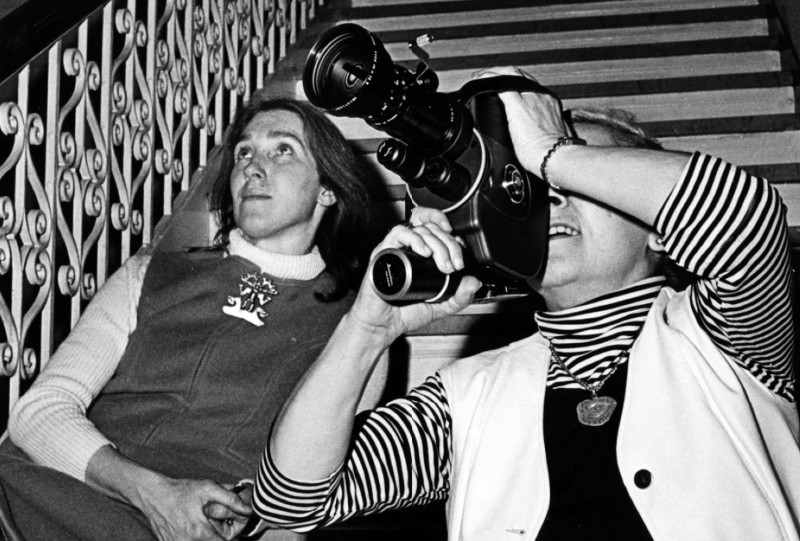
Filmmaker, enthusiast, advocate, meticulous curator, promoter, free spirit and nurturing mother of avant garde film.
Those are the words used to describe Sally Dixon in Brigid Maher’s documentary Experimental Curator: The Sally Dixon Story.
Dixon’s role as filmmaker, advocate, and curator of films at the Carnegie Museum made her a key if less-known figure in the emerging experimental avant-garde film movement. Her work was crucial to gaining recognition and financial backing for such key figures as Jonas Mekas, Stan Brakhage, Bruce Baillie, James Broughton, and Kenneth Anger. She was also an advocate for women filmmakers such as Carolee Schneemann. Women filmmakers often found it difficult to gain acceptance in the male-dominated field. Dixon opened doors for them.
The Ann Arbor Film Festival will screen Maher’s feature documentary at 1 p.m. Sunday, March 27, in the main auditorium of the Michigan Theater. The documentary will be followed by four short experimental films: Fist Fight by Robert Breer, Valentin de las Sierras by Bruce Baillie, Invocation of My Demon Brother by Kenneth Anger and Take Off by Guvnor Nelson.
The Ann Arbor Film Festival has long been a major home for experimental film. This documentary should be just the ticket for those seeking a little history on a movement that had a whole different view of what movies could be about than Hollywood.


































